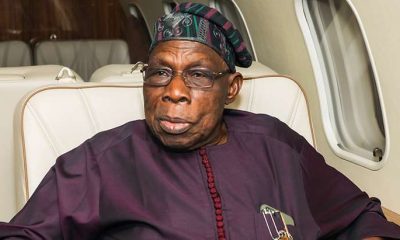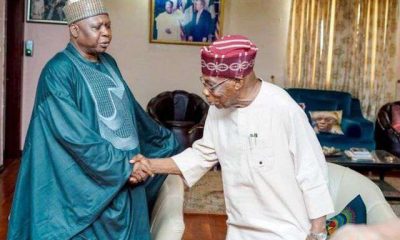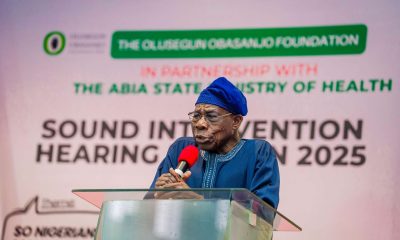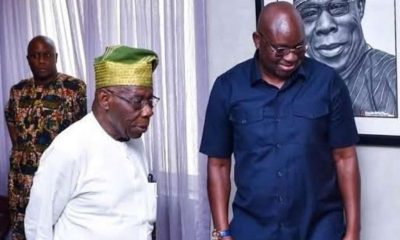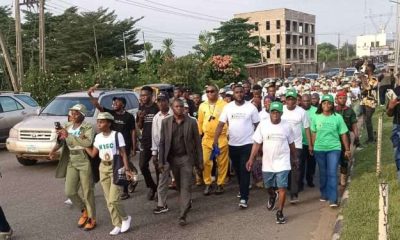Politics
Again, demand for new constitution deadlocks over resource control
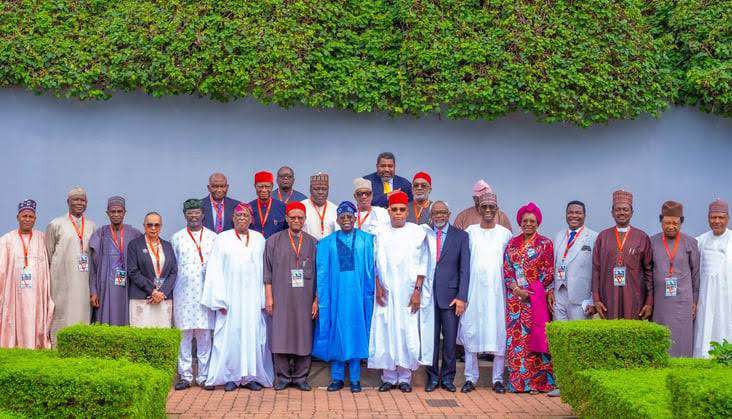
…as Obasanjo opposes calls for fresh constitution
The demand for true federalism has, for over two decades, been a recurring theme in national discourse. And last week, a group of eminent Nigerians under the umbrella of The Patriots, gathered in Abuja with the objective to finally see it materialize. But even this renewed quest is now being detailed by the country’s intractable fault-lines.
Successive governments have danced around the issue, with various conferences and constitutional review panels failing to produce a solution. The contentious debate over resource control has persistently driven a wedge between the North and the South. Once again, this fault line came into sharp focus at the just-concluded three-day National Summit on the Future of Nigeria’s Constitutional Democracy, convened in Abuja by The Patriots.
The summit, which ran from Wednesday to Friday, was aimed at charting a pathway towards a new, people-oriented constitution that would restructure Nigeria back to a genuine federal system. It brought together some of the country’s most notable figures, including former President Olusegun Obasanjo, former Commonwealth Secretary-General Emeka Anyaoku, former Akwa Ibom State governor Obong Victor Attah, and former Sokoto State governor Aminu Tambuwal, alongside prominent socio-cultural groups, such as Afenifere, PANDEF, and Ohanaeze Ndigbo.
The gathering followed months of consultations by The Patriots, including high-level meetings with President Bola Tinubu, as the nation grapples with worsening economic hardship, insecurity, and political disillusionment.
The summit sought to address Nigeria’s structural problems through bold constitutional reforms, with participants debating issues, such as state police, devolution of powers, judicial independence, and electoral reforms.
Deep-seated Cracks
But despite the optimism that greeted the high-profile meeting, deep cracks soon emerged, most notably over the sensitive issue of resource control. While delegates agreed in principle on the need for a return to true federalism, the question of allowing Nigeria’s regions or states to control their natural resources proved to be a major stumbling block.
The tension came to a head on Thursday when constitutional lawyer, Chief Mike Ozekhome (SAN), began reading the draft communiqué at the end of the day’s proceedings. As soon as he got to the section that proposed that each region should control its resources while paying royalties to the federal government, a faction of participants – mostly from the North – heckled him, interrupting the session.
According to witnesses, the heckling soon escalated into a chaotic scene, forcing organisers to halt the reading. “The Northern delegates insisted that resource control was non-negotiable,” one participant told Business Hallmark. “They argued that it would deepen inequality and disadvantage resource-poor states, especially in the North.”
The session was adjourned to allow for further consultations among the stakeholders. However, by Friday, the rift remained unresolved. As a result, the contentious clause on resource control was quietly dropped from the final communiqué read by Anyaoku, who chaired the summit.
The compromise underscored the enduring deadlock over one of the most polarizing topics in Nigeria’s political history. Since the discovery of oil in the Niger Delta, the South – especially states in the oil-producing region – has repeatedly demanded greater control of their resources, while the North has strongly resisted, fearing economic marginalisation.
Divided on New Constitution
Beyond resource control, another major fault line emerged over whether Nigeria needs a new constitution altogether or merely a thorough amendment of the current 1999 Constitution.
Many participants, including Anyaoku and Attah, argued forcefully for a fresh start. They dismissed the 1999 Constitution as an illegitimate military decree, lacking both the consent and the aspirations of the Nigerian people.
“The 1999 Constitution is deeply flawed,” Anyaoku said, while presenting the final communiqué. “It was not made by the people and is inadequate for addressing Nigeria’s diversity and challenges. A new, people-driven democratic constitution anchored on true federalism is the only path to stability and meaningful development.”
Obong Victor Attah, a long-time advocate for restructuring, also echoed this sentiment. He described the 1999 Constitution as a relic of military authoritarianism that entrenches excessive centralization of power.
“Our states are little more than administrative appendages of the federal government,” Attah lamented. “We must return to a federal structure, where each region can pursue its development at its own pace.”
However, former President Obasanjo strongly disagreed. Speaking through Olawale Okunniyi, the Secretary-General of The Patriots, Obasanjo argued that the real problem lies not with the constitution but with the failure of political leaders to implement it in good faith.
“From my experience, I will be the first to admit that the 1999 Constitution is not perfect,” Obasanjo said. “But even the best constitution will fail under selfish, corrupt, and irresponsible leadership. Our priority should be reforming leadership, not tearing up the constitution.”
Longstanding North Versus South Divide
The heated debates at the Abuja summit reflect Nigeria’s longstanding North-South divide over federalism and resource control – a debate that dates back to the First Republic. Under the 1960 and 1963 constitutions, Nigeria operated as a true federation, with regions retaining significant autonomy and control over their resources. The military coups of the 1960s upended that system, replacing it with a centralized, unitary arrangement that has persisted under the current 1999 Constitution.
Since then, calls for a return to true federalism have gained momentum, particularly from southern leaders, who believe the current system stifles development, breeds inefficiency, and exacerbates ethnic tensions. The North, on the other hand, has often resisted such reforms, citing fears of economic and political disadvantage.
The Abuja summit was widely expected to bridge these divides, but the disagreements suggest that the latest push for restructuring may follow the path of previous efforts, including the 2014 National Conference, whose recommendations were shelved due to political opposition and lack of consensus.
Broad Agreement on Reforms
Despite the sharp divisions, delegates reached consensus on several other reform proposals. The summit strongly endorsed the creation of state police to address rising insecurity, noting that the centralized police system had proven ineffective.
They also agreed on the need to devolve more powers from the federal government to the states, describing the current presidential system as overly expensive, inefficient, and prone to abuse.
“The current reality is that too much power is concentrated at the centre,” the communiqué read. “The reduction of this enormity will discourage autocratic tendencies and encourage inter-institutional checks and balances.”
On the judiciary, the summit recommended separating the roles of the Attorney-General of the Federation from the Minister of Justice and proposed that each federating unit should have its courts up to the Court of Appeal, with the Supreme Court handling only constitutional and intergovernmental disputes.
Electoral reforms also featured prominently in the deliberations. Delegates called for all elections – presidential, gubernatorial, legislative – to be conducted on a single day, citing examples from countries like Brazil and Ghana. They also pushed for mandatory use of the Bimodal Voter Accreditation System (BVAS) and electronic transmission of results in real-time, as well as constitutional provisions for independent candidacy.
Regional Groups Back Overhaul
Despite the summit’s unresolved tensions, socio-cultural and regional organisations like PAN Niger Delta Forum (PANDEF), Afenifere, and Ohanaeze Ndigbo used the platform to amplify their long-standing calls for a new federal framework.
Speaking on behalf of PANDEF, Ambassador Godknows Igali warned that continued governance under the current constitutional arrangement would only deepen Nigeria’s crisis. “The Niger Delta and other marginalized regions have borne the brunt of this skewed federation,” Igali said. “We demand a constitution that guarantees fiscal federalism, resource control, and equitable development.”
Afenifere and Ohanaeze echoed these sentiments, warning that continued governance under the 1999 Constitution could push Nigeria closer to disintegration.
Yet, the summit’s inability to resolve the contentious issue of resource control has left many observers sceptical about the prospects of this latest push for restructuring.
Political analysts warn that the deep-seated mistrust between Nigeria’s regions, particularly the oil-rich South-South and the resource-poor North, has historically undermined every attempt at constitutional reform.
From the Abuja Constitutional Conference of 1995 to the 2005 National Political Reform Conference and the 2014 National Conference under former President Goodluck Jonathan, resource control has remained a red line. Each time, northern delegates have argued that granting states full control over their natural resources would economically cripple vast parts of the country that rely heavily on federal allocations.
Obasanjo’s Hardline Position
Adding to the complexity is Obasanjo’s firm stance against drafting a brand-new constitution. While many southern leaders see a new constitution as essential for dismantling Nigeria’s centralized governance structure, Obasanjo believes the focus should be on enforcing existing laws and building strong institutions.
“No constitution, no matter how well written, can succeed without responsible leadership,” Obasanjo reiterated during the summit. “Our problem is not the absence of good laws but the deliberate disregard for them by those in power.”
This position put him at odds with other key figures like Anyaoku and Attah, who argue that Nigeria’s constitutional flaws are structural, not merely a matter of leadership. The tension between these two schools of thought—reform vs. replacement—was evident throughout the deliberations.
A Fractured Front
The Patriots had hoped the summit would present a united front in calling for transformative change. Instead, the disagreements over resource control and the constitutional question have exposed fractures within the group itself.
Some delegates privately expressed disappointment at what they called the “watering down” of the summit’s final communiqué. By removing the resource control clause, they argue, the summit lost a critical opportunity to push the national conversation beyond rhetoric.
“Resource control is the heart of true federalism,” one southern delegate said. “By backing down, we risk perpetuating the same injustice that has kept Nigeria trapped in underdevelopment.”
Others, however, defended the decision, arguing that insisting on resource control could have derailed the entire summit. “We needed consensus,” a northern delegate countered. “If we push too hard on issues that divide us, we will never achieve the broader reforms we all agree on, such as devolution of powers, state police, and judicial independence.”
As the summit concluded on Friday with Anyaoku reading a pared-down communiqué, there was both relief and frustration in the air. While the Patriots managed to agree on several reform proposals, the lingering disputes cast a shadow over the event’s legacy.
Many fear that, like previous conferences, the Abuja summit could end up as another missed opportunity – its recommendations shelved by a federal government reluctant to confront entrenched interests.
President Tinubu, who has repeatedly promised to pursue constitutional reforms, has not yet made clear how he intends to navigate the minefield of regional demands. His administration’s cautious stance on restructuring, coupled with mounting economic and security crises, raises questions about whether this summit will translate into concrete policy action.
Why True Federalism Remains Elusive
Observers say the root of the problem lies in Nigeria’s rentier economy, where the bulk of government revenue comes from crude oil exports. The current revenue-sharing formula, enshrined in the 1999 Constitution, allocates a significant share of oil revenues to the federal government for redistribution among the states.
Despite the setbacks, The Patriots remain committed to pursuing constitutional reform. Anyaoku, in his closing remarks, called on President Tinubu to introduce an Executive Bill to the National Assembly to enable the Independent National Electoral Commission (INEC) to organize elections for a Constituent Assembly.
This assembly, he said, should be tasked with drafting a new democratic constitution, which would then be subjected to a referendum. “We must give the Nigerian people the opportunity to decide how they wish to be governed,” Anyaoku said.


